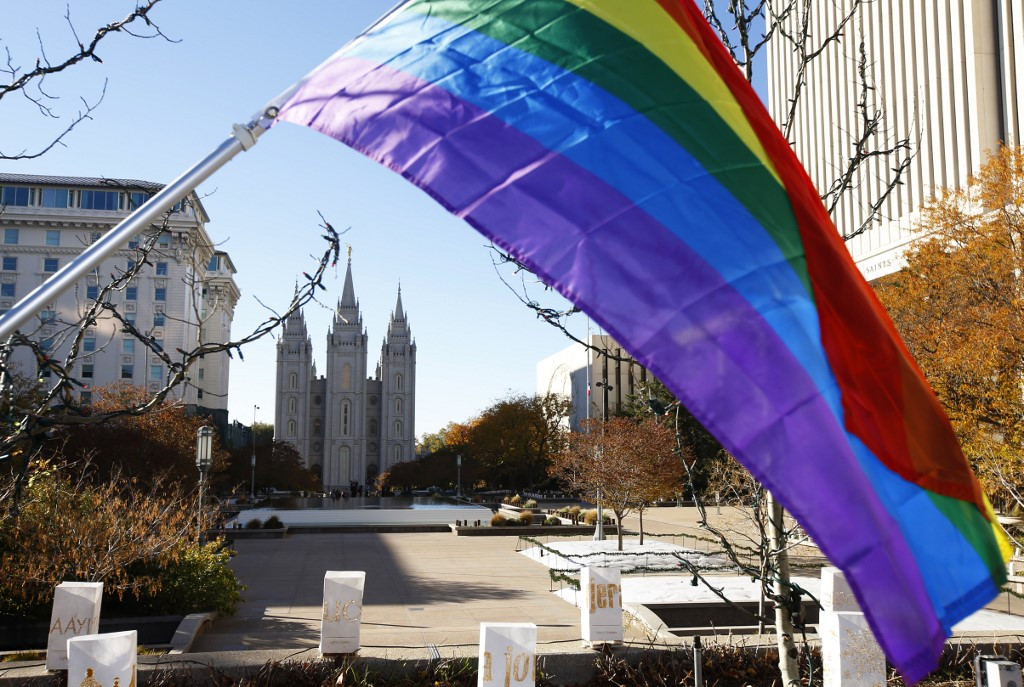Popular Reads
Top Results
Can't find what you're looking for?
View all search resultsPopular Reads
Top Results
Can't find what you're looking for?
View all search resultsLGBT+ community at heightened risk of coronavirus, groups warn
Change text size
Gift Premium Articles
to Anyone
 A pride flag flies in front of the Historic Mormon Temple as part of a protest where people resigned from the Church of Jesus Christ of Latter-Day Saints in response to a recent change in church policy towards married LGBT same sex couples and their children on November 14, 2015 in Salt Lake City, Utah. (AFP/George Frey/Getty Images)
A pride flag flies in front of the Historic Mormon Temple as part of a protest where people resigned from the Church of Jesus Christ of Latter-Day Saints in response to a recent change in church policy towards married LGBT same sex couples and their children on November 14, 2015 in Salt Lake City, Utah. (AFP/George Frey/Getty Images)
M
ore than 100 LGBT+ rights groups on Wednesday called on US public health officials to address the heightened vulnerability of gay and trans people to the coronavirus, warning that their frequently weakened immune systems can put them at risk.
Rates of HIV and cancer that are higher than in the overall population make LGBT+ people susceptible to the virus, said the open letter signed by such groups as the Human Rights Campaign, Lambda Legal and GLAAD, a media advocacy organization.
Described by the World Health Organization (WHO) on Wednesday as a pandemic, the coronavirus that emerged in China in December has spread around the world, halting industry, grounding flights, closing schools and forcing events to be postponed.
More than 118,000 infections have been counted in 114 countries, and 4,291 people have died of the virus, the WHO said.
In the United States, more than 1,000 cases and 31 deaths have been reported.
"We call on public health officials to ensure the LGBTQ community is considered and included in the public health response to COVID-19 based on potential risk factors ... in our community," said Dr. Scott Nass, president of GLMA, an LGBT+ health advocacy group, in a statement.
Older people and those with serious chronic medical conditions are at a higher risk, according to the U.S. Centers for Disease Control and Prevention (CDC).
Compromised immune systems linked to HIV and cancer put gay and trans people at risk, and the groups said the more than 3 million LGBT+ older people in the United States also may be less likely than their straight peers to seek medical care for fear of discrimination.
Read also: Social media: Double-edged sword for LGBT+ Asia
The open letter called on officials to make sure messages about the coronavirus include information targeted to gay and trans people and to provide resources directing people towards LGBT-friendly health care providers.
In response to the virus, the United States on Wednesday was weighing new travel restrictions, and the federal health agency said officials were working with local officials in the hardest-hit states.
But critics such as New York Gov. Andrew Cuomo said states were left on their own to make enough testing available, and the head of the government's National Institutes of Health warned a congressional hearing that the outbreak would only get worse in the United States.
"As the media and health communities are pushed into overdrive about COVID-19, we need to make sure the most vulnerable among us are not forgotten," said Dr. Scout, deputy director for the National LGBT Cancer Network. Scout does not use a first name.
People who identify as lesbian, gay or bisexual are more likely than straight people to rate their health as poor and to have more chronic conditions, according to research by the Kaiser Family Foundation, a US health policy analysis group.
According to 2018 government data, gay and bisexual men account for more than two-thirds of US HIV diagnoses, and CDC data in 2017 found the percentage of trans people diagnosed with HIV was triple the national average.










